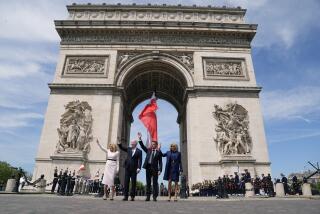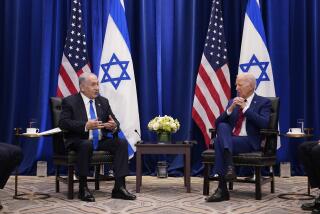Bush and Mitterrand Optimistic on Mideast : Diplomacy: The two presidents play down their policy differences after meeting on Martinique.
- Share via
TROIS-ILETS, Martinique — President Bush and French President Francois Mitterrand met on this tropical island Thursday to discuss the prospects for peace in the Middle East and afterwards expressed optimism but offered no specifics.
The two leaders have not “settled on one path, one single approach” for breathing new life into the long-stalled Middle East peace process, Bush said, insisting that “we do not have a set formula.”
Nonetheless, he said, the successful result of the war against Iraq has given the United States “more credibility” in the region and has opened opportunities for peace that should be explored.
In a news conference after their two-hour meeting at a former sugar-cane plantation and rum factory among the island’s lush hills, both leaders took pains to play down their differences.
Mitterrand was flexible about his often-repeated proposals for an international Middle East peace conference and his advocacy of some form of a Palestinian state.
Bush, asked about Mitterrand’s suggestions, said “a Palestinian state is not the answer” to the problems of the region but added that the Palestinian “homeland question” must be addressed in some way and that “all ideas that can make a contribution to peace should be put on the table.”
Asked about the continuing rebellions within Iraq against Saddam Hussein’s regime, Bush reiterated his concerns about the Iraqi army’s use of helicopters to attack rebel groups and vowed that U.S. “troops are not going to be, all of them, out of there until there is a (formal) cease-fire.”
At the same time, however, he insisted that he is not concerned about the cease-fire process bogging down and that he does not foresee a “Korean-like situation” in which U.S. troops would have to remain in place for years while a cease-fire is negotiated. Iraq’s rapid compliance so far with most demands made by the allied coalition has provided “a reason to be optimistic,” he said.
Mitterrand, for his part, said he believes that French forces have “done our job” and that the U.S.-led Persian Gulf coalition did not have a mandate to “re-establish law and order” in Iraq. He did not suggest, however, that French forces will be pulled out prematurely if allied military leaders ask for their continued presence.
Both men sidestepped a question about whether a regime run by Shiite Muslim fundamentalists in Iraq would be better or worse than continued rule by Hussein. Shiite groups backed by Iran have been among the leaders of the rebellions in the southern part of Iraq.
The two also avoided direct answers to questions about the future role of the Palestine Liberation Organization and its chief, Yasser Arafat, in any Middle East negotiating process.
In recent weeks, Bush and his aides have spoken disparagingly about Arafat, who strongly supported Hussein during the war. The French, by contrast, have counseled patience, noting that Arafat and the PLO continue to have substantial support among the Palestinians.
Mitterrand repeated that point at the joint news conference, saying “it is for the Palestinians to answer” the question of who should represent them in negotiations.
Bush again said that he was disappointed by Arafat’s conduct during the war. But, he added, “we’re not writing off anything.”
For now, he said, “we don’t have any intention of resuming” the direct talks with the PLO that the Administration conducted last year. Noting that several Palestinian representatives who live in the Israeli-occupied territories met with Secretary of State James A. Baker III earlier this week, Bush said that “we’ll pursue that track for a while.”
More to Read
Sign up for Essential California
The most important California stories and recommendations in your inbox every morning.
You may occasionally receive promotional content from the Los Angeles Times.














